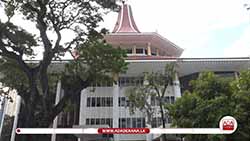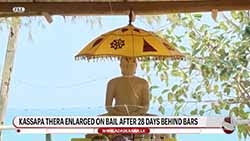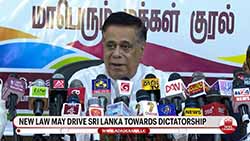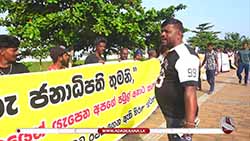Impeachment motion passed in Parliament
January 11, 2013 08:05 pm
The impeachment motion against Chief Justice Dr. Shirani Bandaranayake was passed in parliament with a majority of 106 votes with 155 voting for and 49 MPs voting against it, Ada Derana reporter said.
The impeachment motion against the Chief Justice was taken up for debate on January 10 and 11 while the vote was taken at 6.30pm today (January 11).
A tense situation was reported in Parliament as sittings was suspended for 10 minutes prior to the vote on the impeachment after the opposition had claimed that today’s agenda did not mention a vote on a motion.
However, Speaker Chamal Rajapaksa after reconvening the parliament informed its members that the impeachment motion can be taken for vote.
Last month, a parliamentary committee ruled that Bandaranayake was guilty of possession of unexplained wealth and misuse of power and declared her unfit for office.
The Supreme Court on January 01 had interpreted the constitution holding that a Select Committee does not have the power to arrive at a finding against a Judge of a Superior Court, while the Court of Appeal on January 03 exercising writ jurisdiction quashed the decision of the PSC.
The Appeal Court further explained that allegations against a judge could only be investigated by an entity with judicial authority. If not the authority of the whole judiciary of the country could be threatened, the Court added.
The PSC was established under the standing order 78(A) and the aforementioned order is not a law, the Appeal Court observed.
Court hence stated that in order to inquire allegations against the Chief Justice, Parliament needs to appoint and committee or an entity endowed with judicial authority.
However, the parliament had decided to go forth with the debate on the impeachment motion.
In view of this the Lawyers Collective today called upon Supreme Court Judges to refuse to accept an appointment of an acting Chief Justice or refuse to recognise any person appointed to the office of Chief Justice claiming that such an appointment would be in violation of the country’s constitution.
In view of the interpretation given by the Supreme Court and the decision of the Court of Appeal, the attempt to remove the Chief Justice from office is without any legal basis and contrary to the Constitution and the law of the land, the lawyers’ collective said in an open letter to Supreme Court judges.
Meanwhile the United National Party announced that it would vote against the impeachment while the Democratic National Alliance and Communists Party of Sri Lanka decided to abstain from voting.
Sri Lanka’s first female chief justice Shirani Bandaranayaka on December 8 was found guilty on three counts set out in the impeachment resolution submitted by 117 Members of Parliament.
The charges against Shirani Bandaranayake included financial irregularities, conflict of interest, and failure to declare her assets.
Bandaranayake has denied the allegations and accuses the government of denying her a fair trial.
A lawyer for Bandaranayake said she had been framed, describing her as the victim of a “set-up job”.
Bandaranayake last year ruled against a bill proposing a budget of 80 billion rupees ($614 million) for development, saying it had to be approved by nine provincial councils.
The ruling angered the government and its backers, some of whom accused the judiciary of overstepping its authority.
Under impeachment proceedings launched last month, parliament speaker Chamal Rajapaksa, appointed a committee of 11 members, seven of them from the ruling party, to investigate 14 charges against Bandaranayake.
The United States, the United Nations, United Kingdom and the Commonwealth have raised concerns about the process and called on the government to ensure the independence of the judiciary.
The government which has more than a two-thirds majority, needed only 113 votes in the 225-member legislature to remove the chief justice from her post.
The impeachment motion against the Chief Justice was taken up for debate on January 10 and 11 while the vote was taken at 6.30pm today (January 11).
A tense situation was reported in Parliament as sittings was suspended for 10 minutes prior to the vote on the impeachment after the opposition had claimed that today’s agenda did not mention a vote on a motion.
However, Speaker Chamal Rajapaksa after reconvening the parliament informed its members that the impeachment motion can be taken for vote.
Last month, a parliamentary committee ruled that Bandaranayake was guilty of possession of unexplained wealth and misuse of power and declared her unfit for office.
The Supreme Court on January 01 had interpreted the constitution holding that a Select Committee does not have the power to arrive at a finding against a Judge of a Superior Court, while the Court of Appeal on January 03 exercising writ jurisdiction quashed the decision of the PSC.
The Appeal Court further explained that allegations against a judge could only be investigated by an entity with judicial authority. If not the authority of the whole judiciary of the country could be threatened, the Court added.
The PSC was established under the standing order 78(A) and the aforementioned order is not a law, the Appeal Court observed.
Court hence stated that in order to inquire allegations against the Chief Justice, Parliament needs to appoint and committee or an entity endowed with judicial authority.
However, the parliament had decided to go forth with the debate on the impeachment motion.
In view of this the Lawyers Collective today called upon Supreme Court Judges to refuse to accept an appointment of an acting Chief Justice or refuse to recognise any person appointed to the office of Chief Justice claiming that such an appointment would be in violation of the country’s constitution.
In view of the interpretation given by the Supreme Court and the decision of the Court of Appeal, the attempt to remove the Chief Justice from office is without any legal basis and contrary to the Constitution and the law of the land, the lawyers’ collective said in an open letter to Supreme Court judges.
Meanwhile the United National Party announced that it would vote against the impeachment while the Democratic National Alliance and Communists Party of Sri Lanka decided to abstain from voting.
Sri Lanka’s first female chief justice Shirani Bandaranayaka on December 8 was found guilty on three counts set out in the impeachment resolution submitted by 117 Members of Parliament.
The charges against Shirani Bandaranayake included financial irregularities, conflict of interest, and failure to declare her assets.
Bandaranayake has denied the allegations and accuses the government of denying her a fair trial.
A lawyer for Bandaranayake said she had been framed, describing her as the victim of a “set-up job”.
Bandaranayake last year ruled against a bill proposing a budget of 80 billion rupees ($614 million) for development, saying it had to be approved by nine provincial councils.
The ruling angered the government and its backers, some of whom accused the judiciary of overstepping its authority.
Under impeachment proceedings launched last month, parliament speaker Chamal Rajapaksa, appointed a committee of 11 members, seven of them from the ruling party, to investigate 14 charges against Bandaranayake.
The United States, the United Nations, United Kingdom and the Commonwealth have raised concerns about the process and called on the government to ensure the independence of the judiciary.
The government which has more than a two-thirds majority, needed only 113 votes in the 225-member legislature to remove the chief justice from her post.












